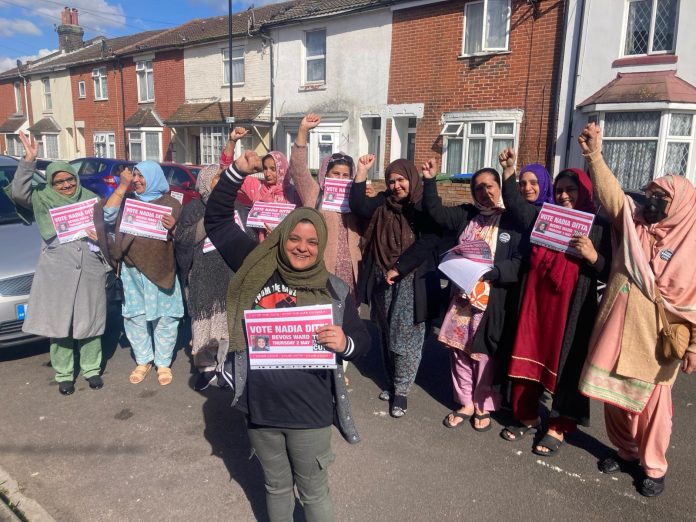How are you going to make your distrust and disgust with the establishment politicians known on 2 May?
In 263 local election wards, there will be an opportunity to vote for working-class, anti-cuts, socialist fighters, standing as part of the Trade Unionist and Socialist Coalition (TUSC), Socialist Party members among them. TUSC is also standing for Salford mayor and in four Greater London Assembly constituency seats.
These will be the last elections, on a nationwide scale, before the impending general election that will almost certainly usher in a Labour government led by Keir Starmer, set to continue cuts to local services. Socialist Party members up and down the country are fighting for candidates on the side of workers, not the bosses – making the case for socialist change. Join us, help our campaigns.
Southampton – Bevois socialist campaign going down a storm
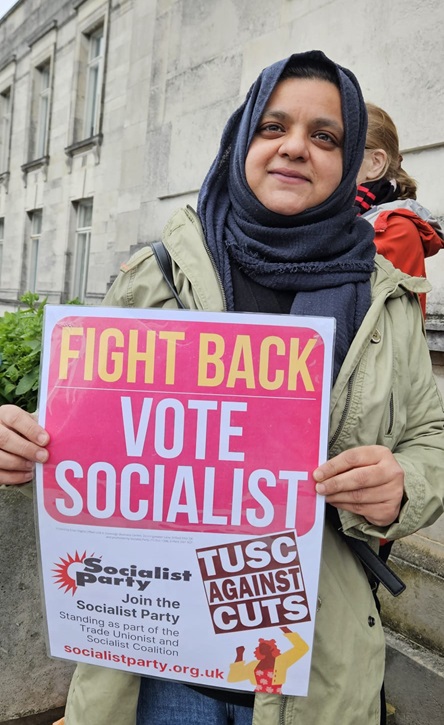
Nadia Ditta, Socialist Party member and TUSC candidate in Bevois ward
We’ve been extremely busy here in Southampton.
We have eight mosques in Bevois ward. Ten of us were out after Friday prayers, handing out special cards with a strong message of voting for the Trade Unionist and Socialist Coalition (TUSC). This was received very well.
I spoke at the council’s budget meeting about the damage cuts are doing. I said:
“Investment is needed in people, and the quality of life we offer them. Areas such as Bevois ward need to stop being neglected, and to be invested in, or this horrendous poverty cycle we are in will just keep going around and around.
“When a country like the UK can send £100 billion to support wars, but then closes youth centres, closes old people’s homes, struggles to keep leisure centres open, stops meals on wheels, and hardly has fully functioning libraries, people are entitled to ask questions of the people who are supposed to be looking after their needs.”
The Daily Echo reported our Labour council leader saying that “over £500 million has been stolen from local residents”. So I said: “Now with the likelihood of a Labour government coming in, will the councillors be asking their Labour leader for this money to be replaced?”
We’ve been campaigning seven days a week – twice a day, with two different groups going out everyday.
We managed to get lots of women together for our campaign day, led by the community, organised by Noreen Younis. They managed to put 72 posters up in windows.
We have been invited to the local mosque for iftar. It gave us an opportunity to speak to the community.
I was also invited to Awaaz FM, a local South Asian radio station. It was the community hour, and really good questions asked.
We held a successful open Socialist Party meeting to discuss challenging Keir Starmer and Rishi Sunak at the ballot box. How George Galloway winning shows a strong sign that things are changing. People are looking for an alternative.
We still have a Socialist Party campaign stall in the city centre every Saturday. And we attend protests for Palestine in Southampton.
We support local strikes. For example, giving solidarity to striking train drivers in Aslef union at the Northam Depot in Radcliffe Road. They are on strike to protect their working conditions from management attacks, and campaigning to renationalise rail from private profiteers.
I have made four short videos, and sent them out to the community. They’re doing the rounds, and have a real buzz going around the area.
I’ve have seen the videos up on people’s WhatsApp statuses, as well as other social media platforms. They are being viewed by thousands of people now.
What we are doing in Bevois ward is amazing. We are interacting with 40 to 60 people a day.
We are listening to the concerns of people. We explain what the Socialist Party stands for.
We have people wanting to join the Socialist Party, and come to our meetings, as we resonate with them. They want to be able to feed their children, without using food banks.
So far, most of the people we speak to say they will vote TUSC. We haven’t really stopped since December, but more so since March!
We are giving people a different way of thinking. That we can fight for our future if we join together.
So bring on 2 May, and until then we keep going, we keep building!
Birmingham council by-election
Socialists are real alternative to largest council cuts ever
Vote Corinthia Ward in Bournbrook and Selly Park
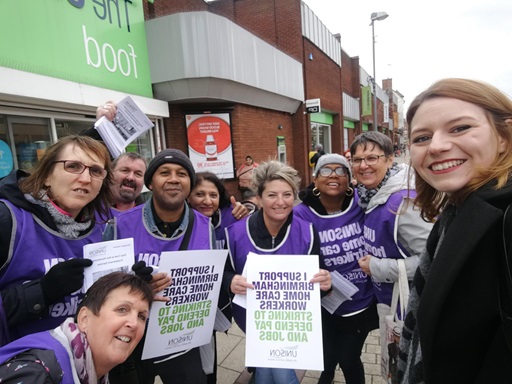
Birmingham Socialist Party statement
Labour cuts councillor Brigid Jones resigned her seat, after years of picking fights with bin and homecare workers, and helping draw up the council’s latest £300 million cuts plans. On 2 May, there will be a by-election in Bournbrook and Selly Park.
The largest-ever cuts in the history of local government include at least 600 job cuts, the closure of 25 out of 35 local libraries, and 50% cuts to both special needs transport and youth services.
Already, in 12 years, the Labour council in Birmingham has cut over £820 million from our services – robbing over 13,000 jobs from our city, closing 43 youth centres, 12 nurseries, 21 children’s centres, five children’s homes, four libraries, and countless community and leisure facilities.
Paying for it
And we’re paying for it, with a 21% council tax increase over two years – on top of years of wages covering less and less of the spiralling cost of bills, food, rent and more.
With thousands of people asking ‘who can I vote for?’, Socialist Party member Corinthia Ward is set to stand.
Corinthia campaigned in 2018-19 against cuts to council homecare workers’ hours, participating in the mass canvasses of Selly Park and other leading councillors’ wards. And was regularly on the picket lines during the bin strikes in 2017-19, and more since.
Corinthia said:
“Since 2010, Birmingham has lost at least £1 billion in funding. The Labour council argued cuts would prevent commissioners from coming in. Well, it did the dirty work for the Tories, and the commissioners have still shown up.
“We cannot just wait for a Keir Starmer government. Starmer said he cannot ‘turn on the taps’ for local government funding, and there is ‘no magic money tree’, with no pledge to reverse cuts to councils.
“We’ve heard this from politicians since 2010. But the UK has 171 billionaires, with a combined wealth of £684 billion. There is vast wealth in our society, but we need political representatives who are prepared to fight for it.
“Bournbrook and Selly Park is the only council ward election this year. The rest of Birmingham isn’t set to vote for their local representative until 2026.
“The seven commissioners have said they may be supervising the Labour council’s austerity plans for a further five years – on £1,000-plus per day each. But councillors have only decided the headlines of how much they want to cut, and not the detail of which libraries, youth centres, etc will close.”
“We have to start now”
“There is still time to build mass opposition to these attacks. But it has to start now.
“The Tory party is weak and divided. Any serious pressure would strain the already existing cracks, and force them to make concessions. And imagine if our Birmingham councillors led a national campaign of councils, taking the funding demand straight to Downing Street.
“The election of a socialist councillor can help raise the confidence of people in Birmingham. We need a workers’ candidate on an anti-cuts and anti-war programme, who will stand up to the commissioners, careerist councillors, and austerity-driven central government – no matter what colour rosette they wear.”
We have a public meeting to give people a chance to discuss how a fighting strategy could defeat the council’s cuts, and how we can build a mass party for working-class people, as a step towards getting the socialist change we need.
Public meeting: Monday 29 April, 7pm
Bournbrook & Selly Oak Social Club, 13A Hubert Road, B29 6DX
Corinthia will be the socialist alternative on the ballot paper in the by-election but not, on this occasion, representing the Trade Unionist and Socialist Coalition (TUSC).
She applied to TUSC to use its name and emblem but, with the Workers Party of Britain also standing, under the TUSC ‘consensus rule’ – that all decisions made in the name of the coalition need unanimous agreement – the all-Britain TUSC steering committee could not issue a certificate to any candidate in the contest.
The Workers Party has participated in TUSC meetings since March 2022, and while, alongside the Social Justice Party, still only wishes to have observer status at this stage, in practice has been given the same rights as the coalition’s other constituent parts.
Local councils should demand arts funding communities need
Sam Hey, Manchester Socialist Party
Arts Council England (ACE) is being ‘reviewed’ by the Tory government, after coming under scrutiny due to a change of guidance earlier in the year. In January, ACE released guidance warning artists ‘political statements’ that may lead to ‘reputational risk’ towards an arts organisation could be grounds for a loss of funding. This blatant attempt at silencing the voices of political artists was met with outcry from a range of artists and Equity, the performing arts and entertainment union, resulting in the guidance being revoked. (See ‘Arts Council England attacks ‘political’ artists funding’ at socialistparty.org.uk).
The Tories’ chronic underfunding of the arts has bred a competitive culture when it comes to funding applications. Smaller arts organisations compete with funding bids, while large organisations can be included in the ‘National Portfolio’, with guaranteed funding for three years straight from ACE. Currently, ACE is responsible for allocating £445 million of spending.
A centralised public body, supposedly ‘independent’ from the government, is poorly placed to deliver art projects tailored to local communities. A move to a more devolved funding system, with decisions made democratically at the local level by councils, would lead to projects focused on localised and long-lasting impact. This model would encourage publicly funded projects to be tailored to specific communities’ needs.
Arts funding can be used in a variety of ways that transcend entertainment. In 2021, the Greater Manchester Combined Authority funded a political art project that used ‘legislative theatre’ to inform the new Greater Manchester Homelessness Prevention Strategy. This project provided work to a group of artists and a large group of people who had experienced homelessness, or were currently homeless, and empowered them to make a legislative impact on local council policy moving forward. This use of arts funding to promote participatory democracy was effective because the people it impacted could see the change they were making in real time, in the area they live in. The review of the project highlighted how underfunded the project was. It stated: ‘The cost is fairly minimal for the amount of engagement, knowledge produced, and relationships fostered.’ We need to campaign for the resources needed to turn this participation into material improvements for people hit by the housing crisis.
Equity has launched a campaign called ‘Stop the Cuts’, demanding local election candidates oppose cuts to existing funding and pledge to ring-fence culture funding in the May elections. It also demands a requirement for union contracts, terms and conditions for all public funding of the arts. I would go one step further, and demand candidates lobby government to increase cultural funding and begin reversing the 40% reduction in funding per person since 2010. This has to be linked to refusing to implement all cuts, using councils’ reserves and borrowing powers and launching working-class campaigns to demand the funding needed from central government.
With local elections on the horizon, I encourage you to ask candidates if they will commit to enriching and strengthening the communities they stand in and support arts funding. Will you vote for someone who will be complicit in the closure of arts venues, companies, and communities across the country, as our cultural heritage is undermined by turning to corporate backers to survive?
In the upcoming local elections, every Trade Unionist and Socialist Coalition candidate will, if elected, stand against the cuts and support local art near to you.
Sam is standing for TUSC in Harpurhey ward
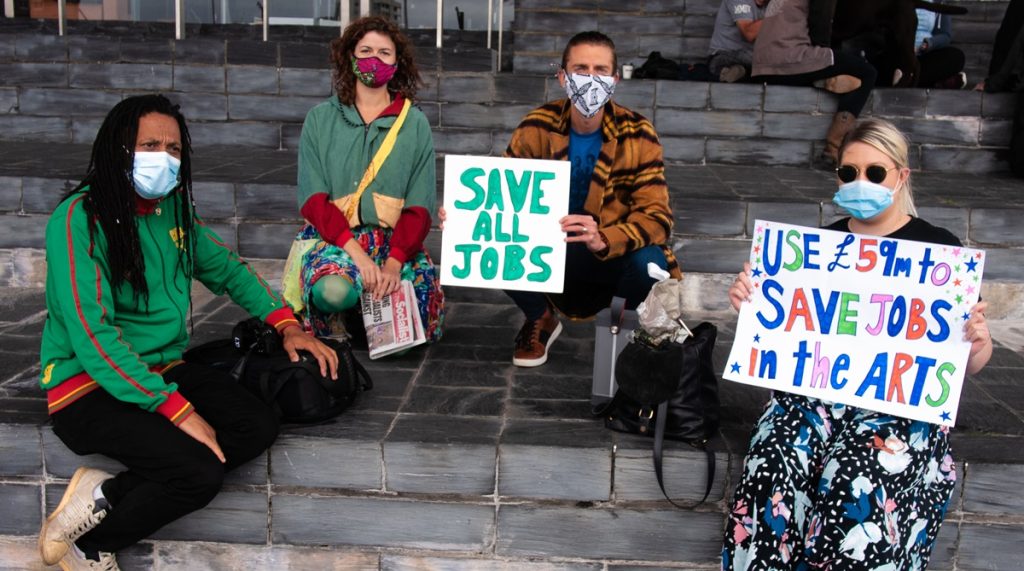
Reading – we can’t make ends meet
Melanie Dent, Reading Socialist Party
Are you aware that 44 of Reading’s 48 councillors voted for a cuts budget on 27 February? Not to mention a 2.99% council tax increase for the coming year.
As a Trade Unionist and Socialist Coalition (TUSC) candidate, this is a question that I will be asking Reading residents in the run-up to the May council elections. Alongside rent increases, and £8.5 million more cuts by the Labour council, things look pretty bleak for local residents.
This is my second time standing for TUSC. We are campaigning against cuts.
The local bus service is owned by the council. But many routes have been cut back, and services are not regular enough, especially at peak times through residential areas.
If they prefer people to use public transport, they’re really not selling us on it. Constant complaints at bus stops on routes I use are about frequency, roadworks and diversions, not to mention the cost.
I will be taking up these, and other local issues in my TUSC campaign, as will others. We need to get the TUSC name out there, and say no to cuts and austerity.
Melanie is the TUSC candidate in Redlands
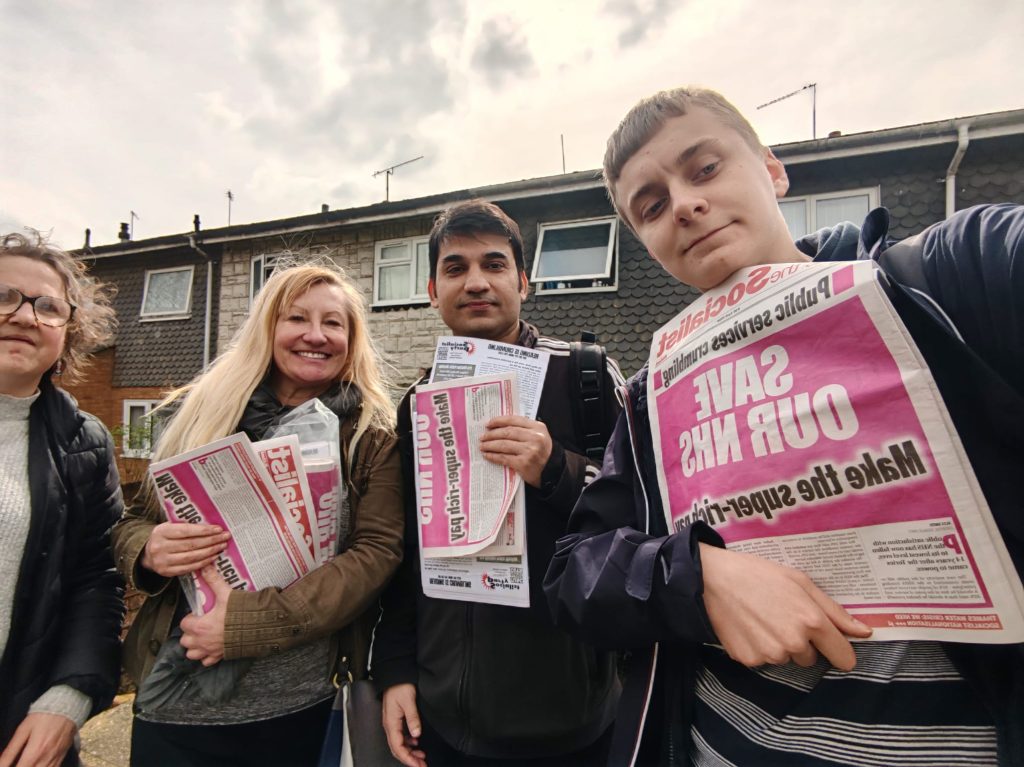
Young people like me should be allowed to stand
Adam Gillman, Reading Socialist Party
14 years of austerity means that schools are crumbling, bus routes are cut, and youth services are almost non-existent.
Austerity has caused an increase in crime, and violent crime too. This is not surprising. Austerity means worse and less services, and private companies taking over public services, running them for a profit.
With cuts to public services, plus all the other issues, such as the cost of living, vulnerable people are hit hardest. Young people have to live through austerity, not knowing when things were better.
The Tory government has not given the money necessary to councils in order to fund public services. But councils have power, they can use their reserves to fund public services. Then take the fight to the government by mobilising trade unions, activists and the community against cuts. It’s a political choice to not fight back, no matter the party in power locally – Tories, Labour, Liberal Democrats, Greens, or Reform.
In the 1980s, we in the Socialist Party (then known as Militant) did this in Liverpool. We won and got the funding from Thatcher’s Tory government. This led to Liverpool running a massive council house building programme, and investing in public services.
Why can’t this happen now? If Labour aren’t going to do it, then we must stand.
It’s clear what will be delivered by a Keir Starmer Labour government by looking at the track record of Labour-run councils, like Reading, implementing massive Tory cuts to services, and raising council tax. We are paying more for worse services.
In this year’s local elections I was going to stand as a candidate for the Trade Unionist and Socialist Coalition (TUSC) in Wokingham. A day after I handed in my forms, and the council finding no problems, I got a call from electoral services. Despite being 18 years old and eligible to vote in the 2 May election, they explained that I couldn’t stand, because the nomination deadline was three days before my 18th birthday.
Despite being old enough to vote, old enough to travel alone, and do many things, I still couldn’t stand. The need to lower the voting and standing age to 16 years old is clear.
In Scotland and Wales, the voting age is already 16. Younger people, who can get a job, and are effected by things such as austerity, should have a voice at the ballot box.
The argument that young people don’t have the capacity to make these decisions is utter nonsense. You have rich right wingers, who have hardly any experience with the day-to-day struggles of working people, who have never worked a day in their lives. Then there are 16 year olds, working long hours on a zero-hour contract, who need to be able to make their voices heard.
This is not an issue of age or generation. The issues facing working-class people affect all ages.
Cheltenham – money doesn’t ‘trickle down’ to working class
Joe Waters, Gloucestershire Socialist Party
Cheltenham is a supposedly well-off town, with a higher median salary and lower unemployment than the national average. The town’s economy is worth over £3 billion, with skilled jobs in cyber-security and tech. The Lib Dem council recently approved spending up to £95 million developing a business park, hoping to further the town’s reputation as a high-tech hub.
However, investment doesn’t flow so freely into working-class neighbourhoods. Basic services are left to crumble, and there are few good jobs.
While local politicians spend millions to draw in private sector investment, they can’t find any economic justification for providing local residents just down the road with regular access to a library, or even a halfway reliable bus service so they can get to work.
Cheltenham is home to prestigious private schools, where the wealthy can have their children groomed to follow in their footsteps. However, Trade Unionist and Socialist Coalition (TUSC) candidates are standing in wards where there’s child poverty, and the social problems it creates.
The town and surrounding countryside is full of shockingly opulent homes for the rich. But for many people, even the most outdated and degraded housing options are increasingly unaffordable.
Landlords cram in more and more people to make easy profit. In student areas, parking is a constant issue. But across town, properties might have multiple luxury cars parked up behind tall, heavy gates.
Most working-class people are well aware of these disparities, and of how little of a priority their needs are to the local authorities. Lots of people have long ago lost interest in voting, as they see no real change on offer.
When we’ve spoken to people in these communities about TUSC, we find real enthusiasm for the idea of standing up for working people, and spending what is needed.
Without TUSC standing, the best that could be hoped for at the local elections would be apologies or excuses. We hope to inspire as many as possible to join us in fighting back.
Joe is the TUSC candidate in Hesters Way
TUSC and no-cuts independent standing in Sheffield
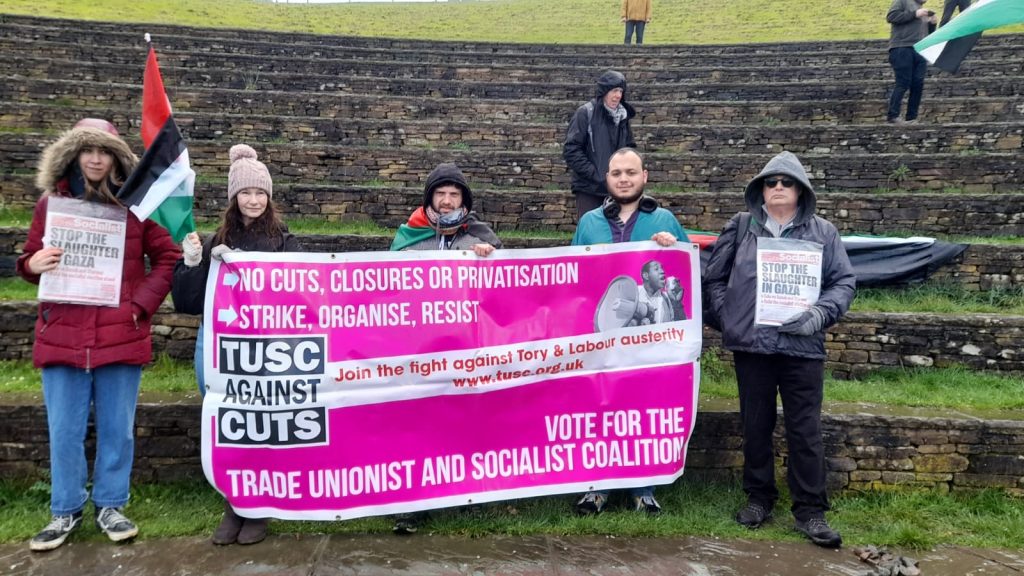
Liam Ball, Sheffield South East Socialist Party
The Trade Unionist and Socialist Coalition (TUSC) launched its campaign for all 28 Sheffield wards, as well as announcing its parliamentary candidates ahead of the general election, in a well-attended public meeting.
Speaking were Sahar Awadallah, a local health worker and Palestinian peace activist, and Mick Suter, a Socialist Party member, and TUSC parliamentary candidate for Sheffield Heeley in the general election.
Mick is going against Labour MP Louise Haigh, a Starmer loyalist who recently announced that the Labour Party would not renationalise any industry if it wins the general election.
Since then, TUSC has stepped down in one ward for the 2 May council election, after discussions with a local community group in Darnall, wanting to put their own anti-war candidate forward. Darnall Independents has agreed to carry our no-cuts platform, alongside their anti-war stance, as a condition for TUSC standing down.
If elected, Qais, the Darnall Independent candidate, like all TUSC candidates, is committed to campaign and vote against any cuts or privatisation of council services. We have raised with the Darnall Independents about their candidate standing under the TUSC banner.
Members of the Socialist Party and TUSC then attended the Darnall Independents’ campaign launch at their mosque, which more than 100 members of the community attended.
Socialist Party member and TUSC election agent Alistair Tice spoke on the reasons for standing down, as well as why we asked for a no-cuts policy to be considered.
We were very warmly received, as were our anti-austerity ideas. We stayed for an hour after the meeting, continuing the discussion with dozens of attendees.
Many said they were inspired by the Rochdale by-election, and of their disgust in Keir Starmer’s stance on what is happening in Palestine. All agreed it was time for change and that potential success could motivate other groups from working-class areas to challenge the political status quo.
TUSC is still standing in Sheffield’s other 27 wards, and we will carry our fight against cuts and war to the ballot box and beyond


